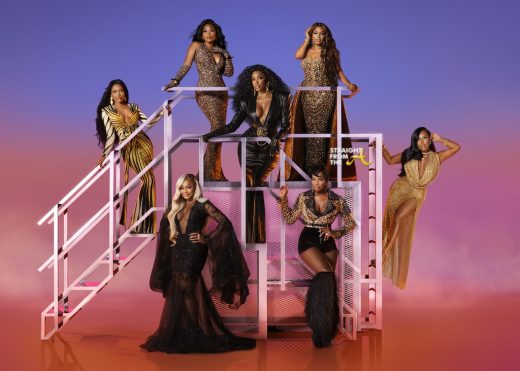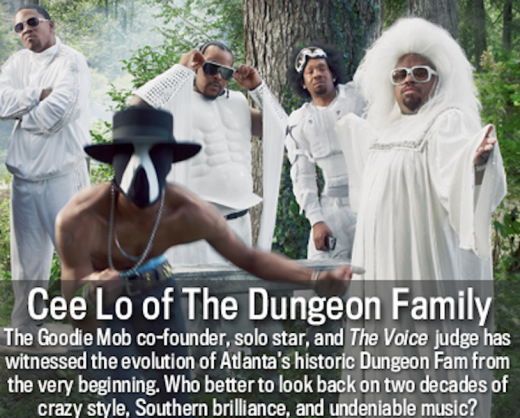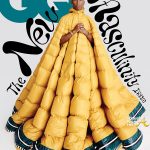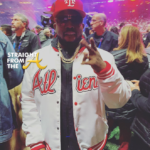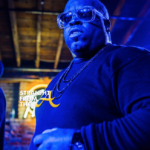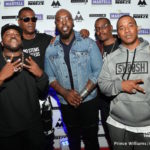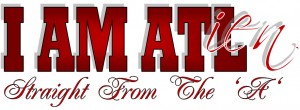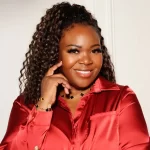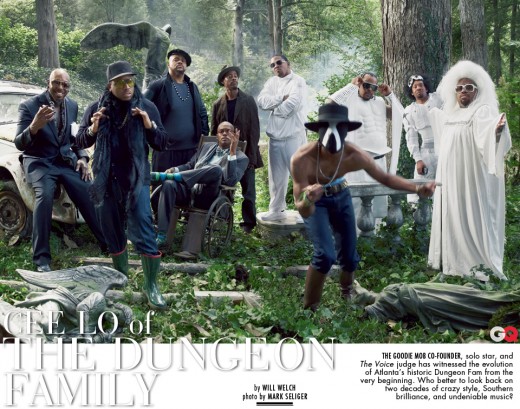
The Dungeon Family‘s full GQ article has finally been released, where they are being recognized amongst “The Survivors” of the music industry.
While some feel there are a few missing from the GQ photo… it’s evident even from the article that only ONE was chosen as “The Voice” of the classic crew.
But at least the gave Big Rube a lil bit of video time… *sigh*
GQ: How did you come to be a part of the Dungeon Family?
Cee Lo: I’ve known Andr? since the third grade. We lost each other for a few years, then reconnected in 10th grade. We were both dropouts and ended up at an alternative school together. I think he was already in a group with Big [Boi]. I forgot Big’s first rap name, I think he was going by Twan.? And Andr?’s name was Jhazz.
GQ: What about you?
Cee Lo: My first rap name was Ralo. Because my first name is Carlos. I likened myself to what Busta Rhymes was doing when he first came out. And what Onyx did when they first came out?they reminded me of me. There was a kinship, a connection to what we call “grimy.”
My forte as a young man was storytelling. Slick Rick was one of my idols. I remember introducing Big and Dr? to DJ Win, back when I was part of a group called G.A. Style. I produced some of the first OutKast stuff. Dre gave me a bunch of albums and I used to do pause button tapes. You know what those are?
GQ: Yeah. You use the pause button to make loops when all you have is two tape decks.
Cee Lo: Exactly. I made Dr? pause button tapes. Then one day Big and Dr? came by wearing LaFace Records T-shirts. They said they were about to get signed to LaFace and a production team called Organized Noize. But at the time, I was loyal to DJ Win and this group we had, G.A. Style.
So anyway, one day I was at the mall, and I recognized this guy Marquez from a group called UBoys that [Dungeon Family founder] Rico Wade was involved with. Marquez was at the pay phone, and my homeboy went up to him and said, “He sing and rap.” So I sang and rapped for him. He said, “I like your singing better than your rapping.” Then he said, “I’m trying to call over to the Dungeon. They’re not answering the phone, but I’m sure it’s just because the music is up too loud.” He needed a ride over there so we took him.
We went in the Dungeon and Sleepy Brown was there and Big Rube was there and Sugar Bear and Mone, of course?he was the gate-keeper back then, Moni Mone. So I sang for them and rapped for them and everybody thought it was cool. Then Rico walked in with Big and Dr?. Dr? got real excited like, “That’s my man Cee Lo I told you about, who do them real good story raps.”
So they had been talking about me. Then the next thing you know, Khujo and T-Mo showed up. And to this day T-Mo’s parents stay a street over from my grandmother’s house, where I grew up. We are brothers. I’ve known him since I was in nursery school. And then Khujo was there; Khujo was known for being a brawler. That’s big ‘Jo. That’s triple O.G., you know what I’m saying?
GQ: Back in 1994, did y’all feel like you were putting the South on the map? Did y’all think about it in terms of kicking down doors?
Cee Lo: We come from so much history, so much heritage in our city, that we’re comfortable in our skin. We come from being G’s. There was something very focused about the spirit that surrounded us, that had been born in us and bestowed upon is. It felt like a mission, like civil service. More like activism than entertainment. We knew we were fighting for the civil rights of Southern hip-hop. Our attitude was strong, outspoken, articulate. We didn’t care about radio formats and such. That’s why “Git Up, Git Out” is eight minutes long.
GQ: I’m from Atlanta, and it’s hard to describe what it was like to have you guys talking about streets and neighborhoods I knew.
Cee Lo: All art stems from a place of alienation. Intimate and alone. Most people are oppressed by the opinion of others, but I was not that way. I was afraid of the repercussions of not doing what I was told to do, what I was called to do by a creator.
I only want to rap about that beautiful black thing that is hip-hop. If it ain’t about that, I have no desire to rap. I come from a time where we didn’t say, “He can rap.” We said, “He can rhyme.” I want to get back to that, and I need Goodie Mob to do that. But I am a fan of black people, the black struggle, black music, and the extreme it can be taken to. I want to burn as a beacon of possibility.
I don’t want nobody to misconstrue the commercial success I’ve had as anything other than an example of what black music is capable of. And what it’s capable of is being more than just black. I’m not black or white anymore. I’m Cee Lo Green.”
READ THE FULL “DUNGEON FAMILY” GQ ARTICLE
I’m glad the Dungeon Family got a bit of mainstream press, but I have to admit I’m disappointed that Ceelo’s was the only voice to be heard….
Thoughts?
![Straight From The A [SFTA] – Atlanta Entertainment Industry Gossip & News - Atlanta's Most Reliable Source of Entertainment Gossip!](https://straightfromthea.com/wp-content/uploads/2015/04/sftalogo31.png)

